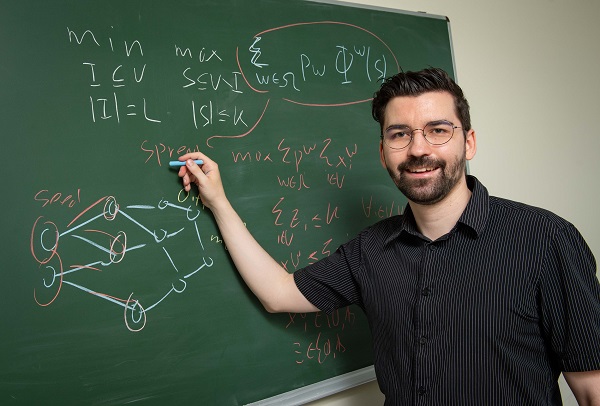What do viruses and influencers have in common? A JKU researcher is studying the similarities: their dispersal pathways.

What do viruses and influencers have in common? Their "message" spreads among those they come in contact with. Markus Sinnl, a logistics expert at the JKU, is conducting research into ways this fact can be included in model calculations for pandemics.
Exponential growth, the chain of infection, super-spreaders… Since the start of the coronavirus pandemic, people – even non-experts – have become familiar with these terms and more. Models are also becoming more familiar with the terminology, particularly in the way spread of the virus is projected. Overall, these models work well as a generalization, however when it comes to the details, the models are flawed.
Dr. Markus Sinnl (JKU Institute of Production and Logistics Management, dept. head: Prof. Sophie Parragh) explained: "The calculations are performed in a very abstract way. They say, for example, that one infected individual can infect 1.5 others. This would mean that the disease can spread evenly throughout the population. In reality, however, things work differently." This is because our contact to others is not evenly distributed. Friends, co-workers, school classes - people are organized in networks, and pandemics develop along these networks.
Sinnl added: "There’s a commonality between the pandemic and influencers..." as advertising messages by online influencers also spread via their networks. There are research findings on this topic and Sinnl aims to apply these findings to create new pandemic models.
The Austrian Science Fund Supports Base-Knowledge Research
The Austrian Science Fund has awarded Sinnl with € 154,000 in funding to develop algorithms that can, for example, simulate Covid-19 dispersion by taking the underlying networks into account. But that's not all. "Up until now, policymakers have had to make decisions based on abstract models without exactly knowing whether or not the measures being taken are the best possible measures." The new algorithms could be a game-changer. The 32-year-old researcher from Linz added: "The new models allow us to mathematically calculate a more ideal outcome. We can make recommendations that yield the best result." This is, however, only true to a limited extent: "The results naturally depend on the quality of the data and due to the amount of data, we certainly can't figure out the best course of action for the whole world." One can, however, make recommendations that would, for example, influence policies that affect school closures and when schools may re-open. These recommendations will be sounder and more verifiable than before, better preparing us in the event of another pandemic.








